So you’re graduating: Six lessons I learned about performing, community, and the arts after year 12

Finishing year 12 feels like the end of an era – but how can you stay connected to the activities and community you love, and continue to achieve success and opportunities as a performer?
A while ago, our manager and music specialist Sylvia Sippl was asked to return to her former high school to give a speech during the specialist music programme’s year 12 graduation ceremony. Given no restrictions on content, Sylvia opted to share some insight into her own post-high school journey through the arts with the graduating music students, and she’s edited her words to share with our own upper school students who have asked us which path to take now that school is coming to an end:
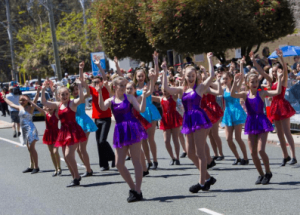
Stay connected with your team and classmates
1. Don’t cut your ties too soon
In many, many ways, by the time you graduate, you have all already succeeded. You’re here. You made it. You all have amazing eyebrows (apparently teenagers no longer go through an “awkward phase” these days?); and yet, no matter how much you want to run and leave high school behind, my first piece advice to school leavers is: don’t cut your ties too soon.
Stay friendly with everyone, even those people you don’t necessarily know that well because you never know who you’ll end up meeting again, whether they end up being your classmates at uni, your colleagues at work, or even a member of the panel at a job interview you attend in future! Even ten years down the track, it pays to be part of a community: school will follow you everywhere, even long after the politics and friendships of high school no longer matter. Join your alumni association, or stay connected with your dance, drama or music studio – opportunity will only knock if it knows where to find you.

Painting my first mural at Pizzaca 2014
2. Say “Yes!”
My next piece of advice: I also encourage you to say “yes” a lot for the next few years. It’s undeniable that if you want to succeed in your field while you’re young, you do need to do a lot of volunteering. What you lack in experience you should make up for tenfold in enthusiasm and energy. In the time since I left high school, I’ve worked at a piano academy, a body piercer, a wedding reception venue, onboard river cruise boats, as a wedding musician, at Sculpture by the Sea, in nightclubs, child care centres, music festivals, cafes, high schools, and more – and I’ve still never actually applied for a job (really!). All I did was say “yes” a lot for the first six or seven years after high school. I stayed friends with everyone I met along the way and when an opportunity came up for work in my field, those friends thought of me and sent customers or employers my way. I kept a meticulous record of all my performances, shows and exhibitions for my resume (even though I edited it depending on who was receiving it), because those performances demonstrate the breadth of my experience, and show prospective producers or employers just how varied and rich my performance history is!
If I hadn’t said “yes” so many times in my youth there’s no way I’d be in the position I’m in now where, under thirty years old, I’m established enough to start saying “no thanks” – I can afford to be picky, now.

Staying connected and saying ‘yes’ can give you all sorts of unique opportunities
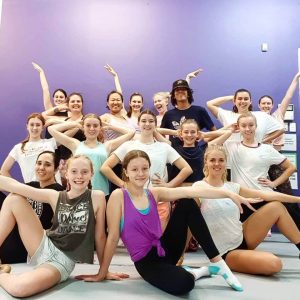
WAPS USA Tour Team 2019
3. Appreciate the skills you have
Now, on the point of young people, jobs and “experience”, why not take this time to reflect upon the unique opportunities open to you as a young performer, that your classmates, friends, or parents may never have had. As a performer (whether musician, dancer, actor, or all three), you have been exposed to a range of unique circumstances and skills:
– You have unparalleled teamwork skills. Performing onstage as part of an ensemble, you have developed that almost-psychic method of nonverbal communication with your teammates or ensemble leader. When someone falls, you all work to pick them up (I mean this figuratively, but who knows!), when someone triumphs, you all share in the joy.
– Some of you have been lucky enough to tour (already!) – whether it be with a school music tour as I did (how many teens can say they’ve performed across Europe?), a Dance Excellence tour with WAPS, or simply hitting a number of dance competitions throughout the holidays. You’ve performed in all sorts of conditions, you’ve changed in all sorts of “green rooms” (I’ve shared a green room with actual cow poop before), and you’ve performed on all sorts of stages. I can’t even begin to tell you how valuable it is to be comfortable, flexible, and professional working in all sorts of environments should you wish to be a professional artist or entertainer, or even just a successful adult!
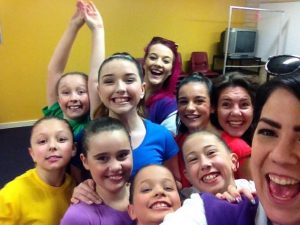
WAPS staff & students backstage
– You are comfortable around adults. You’ve worked more closely with your dance, music or drama instructors than most kids do with their regular high school teachers – they may have helped you into a tight costume, held you as you cried about something that happened on stage, you may have seen them, sweaty, stressed, dragging luggage on an international dance tour, or wrangling performers backstage at a concert and offered some words of encouragement (which are always appreciated). You understand the unique blend of mentor-teacher-role model that more senior performers have – you are in a better position to interact maturely with your uni tutors, your employers, or senior performers you’re lucky enough to share the stage with.
– You’re organised! High school can be a rough time for teens, but not only have you taken on ATAR, VET or general subjects (and the associated study timetables), but you’ve also managed to balance instrumental, dance or drama lessons, regular home practise (because y’all practise every. day. yes?), performances, rehearsals and tours. Once you come out the other side, you begin to realise that things don’t get easier after high school – year 12 is actually not the peak challenge in your life, in fact it’s just a taste of what’s to come, and you are ready for the rest of the meal now.
– You’re realistic, and humble
As a performer, you come from a pretty competitive environment – yes we all support each other no matter what, but artists learn a tough lesson from a very young age: there will always be someone better than you. Hopefully your teachers have instilled in you not to be threatened by skilled colleagues, but to admire them, learn from them, and always push to do your best, no matter what level others are at. Learning dance, music or drama from a young age teaches grace in defeat, resilience, and kindness to those who are not yet at your own level. I can only dream of a world when all young adults have learned this lesson too.
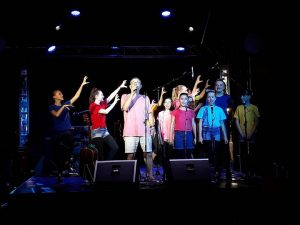
WAPS performing with Peter Combe at Fringe World
4. Pick your pace
I feel it’s important to point out however that sometimes you won’t be ready for things. And that’s ok. It’s alright to work at your own pace. The world is full of challenges, and coming from an environment like high school, where you’re encouraged to pursue success and aim high at all times, a world full of challenges is a really overwhelming place to live sometimes. Personally, I clung to my two main instruments for the first few years after high school, not feeling like I was ready or ‘creative enough’ to try anything new, until I finally got the confidence and drive to try something new and pick up 2 or 3 new instruments and start to experiment with recording music too (which is hard by the way).
Sometimes things just take time, because in order to progress further on your journey, you have to spend time developing the confidence and skills in order to take that next big step. Don’t be discouraged, don’t compare yourself to others who you feel are “ahead” of you, or beat yourself up about it; it happens, it’s called growth, and it takes time.
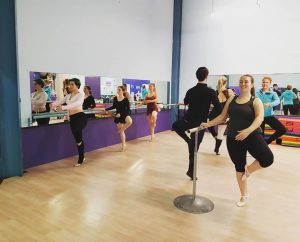
Adult Ballet classes at WAPS
5. Don’t stop dancing, acting or making music!
I absolutely encourage you not to give up your creative pursuits after school – whether you take a gap year, join the workforce, or pursue tertiary study, there is always a place for your music, drama or dance, even if you have to make that place yourself. Once you finish school, you may suddenly realise just how much your parents lovingly invested in your arts education – paying for dance lessons, instrumental tuition, costumes, transport, etc – it all adds up, but it shouldn’t let you stop your creative pursuits! Remember all those benefits of arts education I listed earlier? It’s worth going the extra mile to ensure you retain them. Consider:
– Adult classes. About 10 years after my last high school music lesson, I gathered up the courage and the funds to return to a private violin teacher to work on rebuilding my technique and learning new and creative ways to use my instrument. The effect this has had on my confidence, commitment, and self-belief cannot be understated. If funds are an issue, ask if your tutor can offer fortnightly lessons instead of weekly, or if you’re a dancer, why not join group adult classes! At WAPS, adult dance classes are available after work and uni hours, and can be attended casually, or discounted if you join multiple classes. Maybe your parents will continue to help out with tuition (birthday/Christmas present anyone?), or perhaps there’s even a grant you could apply for! My young students are always surprised to hear that their music teacher has a music teacher of her own. Having a mentor of your own, no matter how long you’ve been performing for, is one of the most valuable things you can do as an artist and teacher – I’ve been playing the violin for 25 years and there’s still so much I can learn.. to think that I’m “done” (as I did when I finished school) strikes me now as incredibly naïve.

Sylvia performed at PIAF with House Gospel Choir in 2016
– Performing. Don’t stop dancing, singing, acting or making music – I’ve never had an adult come to me and say they were glad they stopped performing when they stopped taking lessons, never. I can’t count, however, the number of times adults have expressed their regret at stopping lessons, or ceasing to perform in public – it comes up so often in all sorts of conversations when people find out what I do for a living. Does your uni have a dance team? Do you and your friends want to visit aged care facilities singing to residents? Is there an open mic night at the pub down the street? Take these opportunities and keep your skills fresh – you never know when you’ll meet someone or say ‘yes’ to an opportunity stemming from one of these performances that’ll change the course of your life and career. After high school I joined the WA Charity Orchestra, started by a friend from school (stay connected!) and performed at venues around Perth raising funds for charity – it was such a wonderful way to stay connected with friends from school or from music class, remain active in the arts, and keep my skills up.
– Working. Once you are ready, experienced, professional, flexible and polished… get paid. An ABN is free to obtain and will allow you to work as a contractor for local and national entertainment companies, venues, schools, private clients, and more (plus you can tax deduct your expenses!). One of my first employers was my own piano teacher, who hired me to teach students at her studio – even if it’s part time while you get yourself through uni, working as a professional performer or teacher is not only a unique way to earn a paycheque, but will keep you active in the community, open to new opportunities, and who knows, it might change the course of your career for the better, as it did for me!
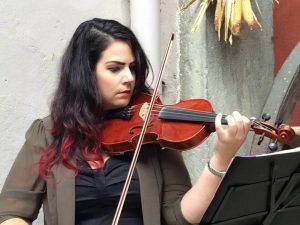
Many memorable gigs arise when your plans go “wrong”
6. Make and break your plans
You may fall into one of two categories of school leaver.. those who aren’t quite sure what they’re going to do next, and those who have planned out every aspect of the next 10 years (hello). Well let me share with you my next bit of knowledge: Plans don’t always work out (and that’s not always a bad thing).
I thought I had it all planned out – I was going to go from high school straight to uni (I did), complete a Bachelor of Fine Arts and Postgrad Diploma in Education (I did), get a job straight out of uni (I did, only because I stayed friends with my mentor from teaching prac, and said “yes” to ridiculously low part-time hours), get married (but if you want to marry your high school sweetheart, my advice is… wait 10 years first), and be an art teacher for the rest of my days. Well, as you can see, I’m now the full-time manager of a performing arts studio, so clearly that didn’t pan out the way I’d planned. Am I unhappy now? Have I lost anything by deviating from my 15 year old self’s starry-eyed plans for my future? Absolutely not. It’s only because I followed my own advice from above, that by the time I felt ready to move on from my high school art teaching job, I was established and experienced enough to snap up an unbeatable opportunity working at the best studio in Perth (I’m a little biased).
Do not beat yourself up if things don’t go to plan. It’s not unusual to change between degrees or courses, to switch jobs, to take a while to settle in to adulthood. Don’t look upon others pursuing their goals and wish you knew your path as well as they do – everyone is different, and you’ll be a different person in 10 years too! Your path is simply made up of whatever steps you take – it’s not magical, it’s not destiny, and it’s going to change direction because that’s what paths do.
So I guess the moral of this story is get out there, go, engage with the community, engage with your peers, keep an open mind and learn from those more experienced than you. Know your worth, and focus your energy on taking the time to develop and improve what’s really important – yourself.
As you embark upon the next stage of your life and try your hand at “Adulting” for the first time, remember that whilst it’s good to have plans, there’s a very, very, very good chance they won’t end up working out; but if you have the right attitude, there’s also a very, very, very good chance that you’ll enjoy the journey regardless of where you end up.
























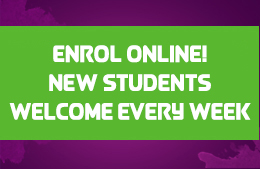
 Studio: 3 Price Street, SUBIACO WA 6008
Studio: 3 Price Street, SUBIACO WA 6008


